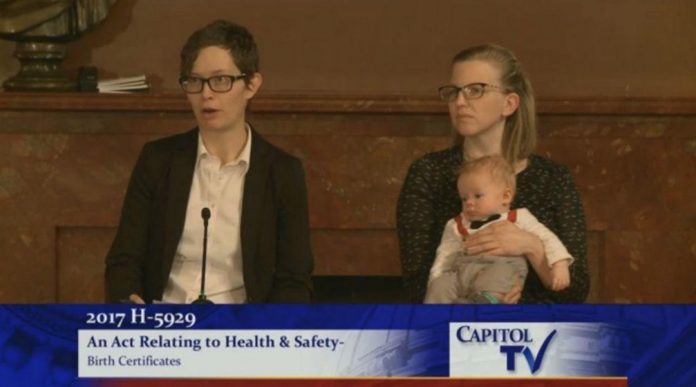
The baby is linked biologically to both of his mothers, Sara Watson and Anna Ford of South County, Rhode Island. The couple used Watson’s egg, while Ford carried and delivered him. But Watson was denied including her name on little Eli’s birth certificate.
“It seems inherently unfair,” Watson told The Providence Journal. “I am my son’s parent. I have been since conception. I was there when we started our 2.5 year IVF journey. I went to every single prenatal appointment. I was present for every minute of his 29-hour labor and delivery [and the time since] snuggling, feeding, changing, burping, and loving on him.”
Watson and Ford thought they had done everything right, making sure to consult with attorneys along the way to ensure they were both legally protected. But when they went to fill out his birth certificate and name him, they were told they could not both be listed on his birth certificate, forcing Watson to legally adopt him. The rigorous process included fingerprinting, a background check, home visits and even paying to place a newspaper advertisement alerting the child’s anonymous sperm donor of her intention to adopt her own child. This last aspect was the most painful, seeming to give the sperm donor more rights than the child’s biological mother.
Earlier this year, state representative Erin Lynch Prada sponsored a bill to address this issue, but Rhode Island Family Court’s Chief Judge Michael Forte blocked its passage, stating the language was confusing. “This should not be rammed through without making sure the interests of children aren’t being compromised,” he said.
Watson and Ford testified at the hearing on the legislation.
According to The Providence Journal:
Current state law provides a place for the name of “the father” to be entered on a child’s birth certificate, regardless of marital status or genetic truth.
More specifically, it says: “If the mother was not married either at the time of conception or birth, the child shall bear the mother’s surname and the name of the father shall not be entered on the certificate of birth without the written consent of the mother and the person to be named as the father unless a determination of paternity has been made by a court of competent jurisdiction…”
McEntee’s bill would add these words to current law: “If the mother is in a same sex relationship at the time of either conception or birth, or between conception and birth, the name of the parenting partner, with the mother’s written consent, shall be entered on the birth certificate as a parent of the child, unless parentage has been otherwise determined by a court of competent jurisdiction.”
And: “The child’s surname shall be determined by the mother.”
In other words, “it puts them in the same position that any heterosexual couple is in,” McEntee said.
The bill will be reviewed this fall by a study commission.
Not a subscriber? Sign up today for a free subscription to Boston Spirit magazine, New England’s premier LGBT magazine. We will send you a copy of Boston Spirit 6 times per year and we never sell/rent our subscriber information. Click HERE to sign up!








